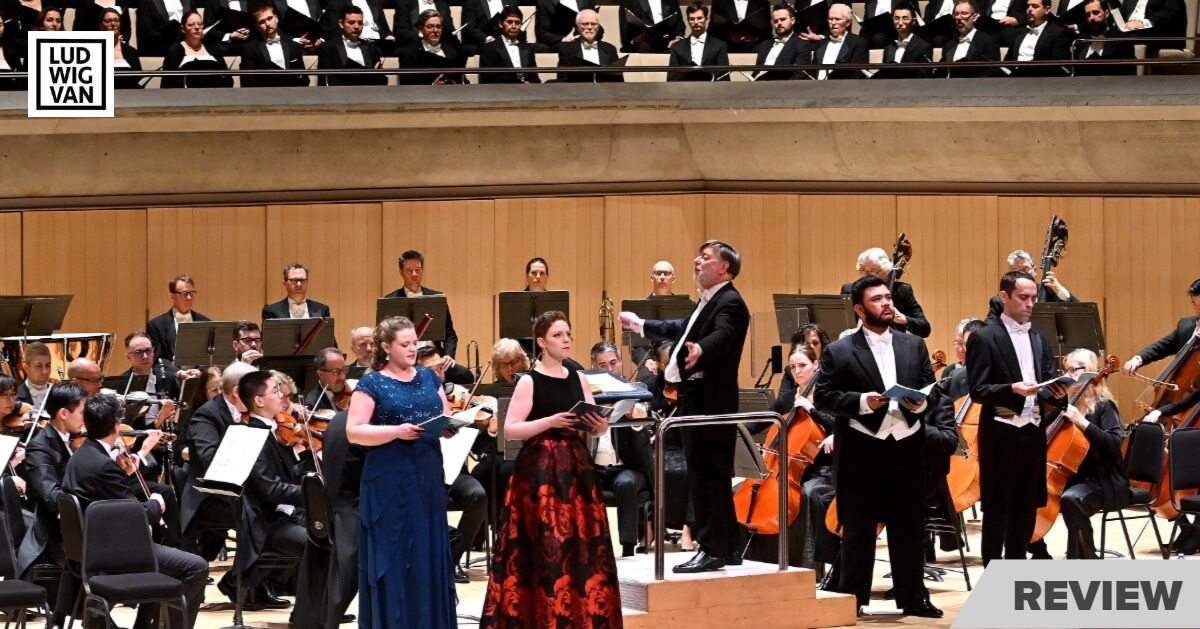
Jenavieve Moore, sop., Jillian Bonner, mezzo, Charles Sy, ten., Trevor Eliot Bowes, bass., Toronto Mendelssohn Choir, Toronto Symphony Orchestra, Sir Andrew Davis, conductor. Roy Thomson Hall, January 18, 2020.
January is Mozart Month at the Toronto Symphony Orchestra. Each year, the TSO offers a delectable selection of his works over a span of about two weeks. Invariably there’s a vocal offering — this year it’s his Requiem, K 626, a piece that he did not live to finish. It’s astounding that, at all of 35 years old when he died, Mozart could have composed something so spiritually profound and musically transcendent as this Requiem Mass. It’s a work that truly defines his greatness.
A frequently performed Mozart piece at the TSO, the Requiem was last heard only four years ago. I had fond memories of experiencing Quebec conductor Bernard Labadie, returning after a serious battle with lymphoma, to lead a great quartet of soloists — Lydia Teuscher, Allyson McHardy, Frederic Antoun, and Philippe Sly. It also boasted a special staging by Against the Grain’s Joel Ivany, who gave the piece his uniquely personal stamp.
This time around, it was a conventional concert performance. The soloists were members of the Equilibrium Young Artists Initiative (EQ), the brainchild of Canadian soprano Barbara Hannigan. In December 2018, it was announced that EQ and the TSO had established a partnership. Hannigan and Sir Andrew auditioned and chose the four early career soloists — soprano Jenavieve Moore, mezzo-soprano Jillian Bonner, tenor Charles Sy, and bass Trevor Eliot Bowes. They attended an intensive EQ workshop last summer with Hannigan at the Lunenburg Academy of Music Performance (LAMP) in Nova Scotia in preparation of their appearances here.
Last evening, the Mozart-sized — ie. reduced — orchestra under Sir Andrew sounded smooth and mellow in the opening Mozart Symphony No. 39, a late work with much to admire, although perhaps not quite so flashy as his other better-known symphonies. To be honest, I attended not because of the Symphony but because of the Requiem, which I love. It’s not easy to do Mozart in a 2,500+ seat Roy Thomson Hall, not exactly known for great sound, even after the acoustic makeover some years ago.
I was sitting in the mezzanine, where the media seats are invariably located. Let’s face it, one needs big voices to be properly heard in Roy Thomson Hall. Of the four soloists, mezzo Bonner and bass Bowes shared top vocal honours, their sizable voices making the requisite vocal impact. The soprano, Jenavieve Moore, sounded light voiced, almost girlish, in her solos, and I would have liked a bit more sweetness to her tone and a more solid trill.
Tenor Charles Sy, whose work I have always enjoyed, sang quite well although the voice was a size too small for the hall, and he sounded uncharacteristically under powered, especially in the ensembles such as in Benedictus. To my ears, the glory of the evening belonged to the Toronto Mendelssohn Choir. At the risk of being branded Toronto-centric, I feel strongly that the TMC is the premiere choral ensemble in Canada. Despite not having a permanent conductor at the moment, the TMC continues to do well. The Sanctus and Rex tremendae were two of the many highlights of the evening.
Finally, kudos to Sir Andrew for his rock-solid conducting. To be sure, he’s an old hand in this repertoire, and it showed. If it was a rather safe, middle-of-the-road reading, so be it — as far as I’m concerned, it’s better this way than to have an idiosyncratic take on this iconic work. Given the inclement weather, the hall was less full than usual, but I dare say those that braved the elements to be there went home happy, having witnessed a fine performance.
#LUDWIGVAN
Want more updates on classical music and opera news and reviews? Follow us on Facebook, Instagram or Twitter for all the latest.



